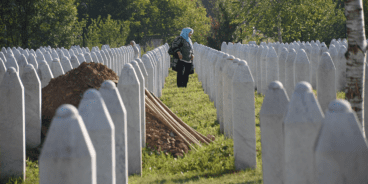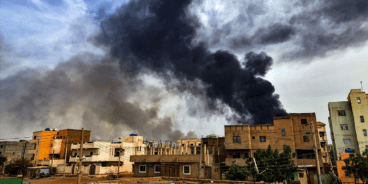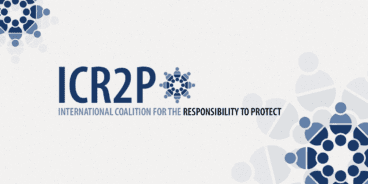
Statement on the 20th Anniversary of the Genocide in Srebrenica
Tomorrow, 11 July, Bosnia and Herzegovina will commemorate the twentieth anniversary of the genocide at Srebrenica, where Bosnian Serb forces systematically murdered approximately 8,000 men and boys and secretly buried them in mass graves. The Global Centre for the Responsibility to Protect will join survivors of the genocide and families of the victims, as well as past and present world leaders, at the official commemoration event at the Srebrenica-Potocari Memorial. In doing so, we acknowledge not just the lives lost but the inexcusable failure of the international community to protect civilians trapped in Srebrenica in July 1995.
Srebrenica was the worst mass killing on European soil since the Holocaust and took place during the 1992-1995 war in Bosnia and Herzegovina. The UN Security Council officially declared Srebrenica a “safe area” on 6 April 1993. Despite promises of sanctuary and the presence of 400 UN peacekeepers, Bosnian Serb forces were allowed to overrun Srebrenica on 11 July 1995. Men and boys were separated from their families and executed over the following ten days. Twenty years later, bodies continue to be identified from mass graves located around the town.
The adoption of the principle of the Responsibility to Protect (R2P) at the 2005 UN World Summit was a result of painful lessons learned from the failure to prevent genocide in Srebrenica in 1995 and in Rwanda during 1994. While the UN and its member states have made significant progress in protecting vulnerable populations since then, people in Syria, Sudan and elsewhere still face mass atrocity crimes today.
Russia’s recent veto of a UN Security Council draft resolution that described Srebrenica as genocide is an affront to the families of the victims. The veto was a denial of history and an act of political expediency. Judgments of the International Criminal Tribunal for the Former Yugoslavia and the International Court of Justice have clearly established the massacre at Srebrenica as genocide and have found several Bosnian Serb leaders guilty of genocide, crimes against humanity and war crimes.
This veto is also symbolic of one of the enduring barriers to halting mass atrocity crimes today. Ongoing divisions within the Security Council and the abuse of the veto, most notably regarding Syria, undermines the international community’s ability to uphold its responsibility to protect populations from genocide, war crimes, crimes against humanity and ethnic cleansing. All five permanent members of the Security Council should adopt a statement of principles by which they commit not to use their veto in any future mass atrocity situation.
Since 1995, the UN has undertaken measures to respond to past failures, including though the adoption of R2P, the establishment of the UN Office on Genocide Prevention and the Responsibility to Protect and, most recently, the creation of the Human Rights Up Front Action Plan. Unlike 1995, UN peacekeepers now have clearly mandated authority to use force to protect civilians facing an imminent threat of mass atrocities.
As we remember the victims of Srebrenica, the Global Centre calls upon the following actors:
UN Member States
-
- Join the Global Network of R2P Focal Points, the largest network of governments dedicated to preventing mass atrocities, by appointing a senior-level official responsible for the promotion of mass atrocity prevention and R2P implementation at the national level.
UN General Assembly
-
- Designate 11 July as the International Day of Remembrance for the Victims of the Srebrenica Genocide and request the UN Secretary-General establish an outreach program to raise awareness about the genocide.
UN Security Council
-
- Hold an annual Open Debate on Genocide Prevention. This will also serve as an opportunity for the UN Secretary-General to update the Security Council on efforts to mainstream the Responsibility to Protect and Human Rights Up Front across the UN System.
- Invite the Special Adviser on the Prevention of Genocide to deliver regular briefings on country situations where there is an established risk of mass atrocities.
- The five permanent members should agree to a “statement of principles” to voluntarily refrain from using the veto in mass atrocity situations. This should happen by the time of the 70th anniversary of the UN in October this year.
As we commemorate the genocide in Srebrenica and stand with the surviving families as they mourn their loved ones, we must strive to ensure that the memory of international failure in 1995 encourages us to halt mass atrocity crimes once and for all. Let the lasting legacy of Srebrenica be a practical determination to uphold our collective responsibility to protect.
Related Content


